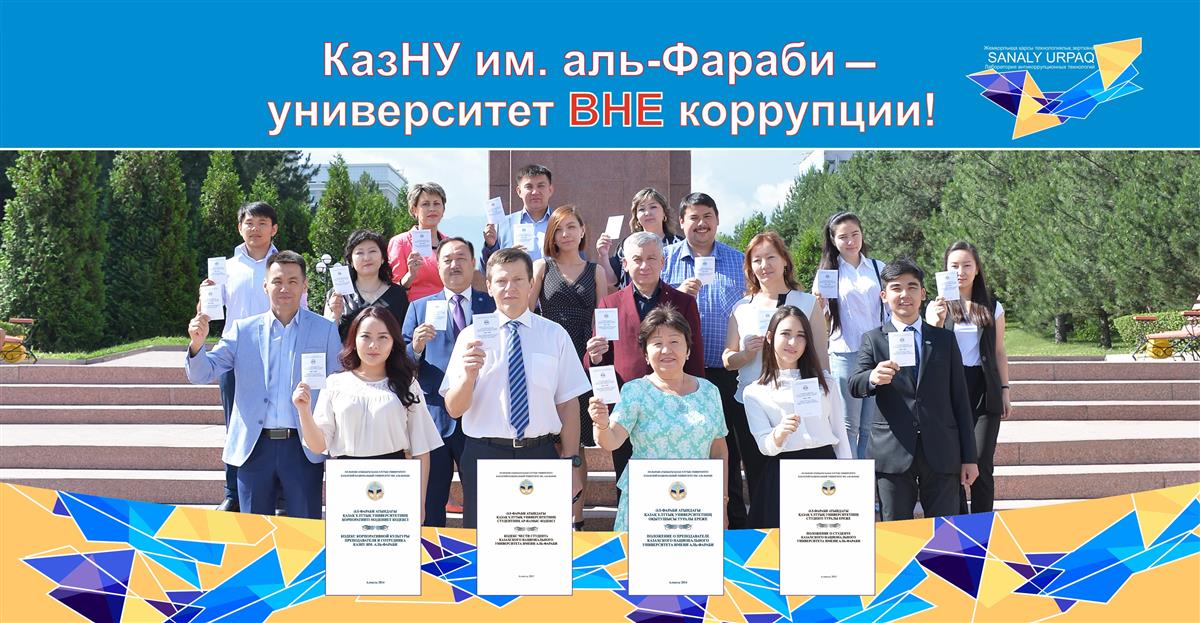CORRUPTION-FREE UNIVERSITY
Views: 3065

The creation of a social environment that is intolerant of corruption and the formation of a strong immunity among young people to such negative phenomena have of paramount importance in the educational and training activities of Universities. Since 2011, the Al-Farabi KazNU, under the leadership of Rector Galym Mutanov, has been implementing the «Corruption-free University» project, which includes a whole range of anti-corruption mechanisms and technologies. During the period of quarantine and the University's transition to distance learning, anti-corruption measures have become particularly important and relevant.
In the conditions of quarantine and transition to distance learning, KazNU is aimed at ensuring transparency, openness of the educational process, high standards of quality of education and objectivity in evaluating students’ achievements. In recent years, the University has created a «smart» information and communication infrastructure and a smart campus, introduced cloud and mobile technologies, and the development of IT services has upgraded the University to a qualitatively new digital level. This has allowed KazNU to promptly transfer the educational process to distance learning according to the current schedule of classes and cover all students. Two information and educational platforms are used for this purpose. This is «Univer 2.0», which is KazNU’s own innovative development that provides support for the entire educational process from student enrollment to graduation. KazNU programmers implemented a unique integration of the Univer 2.0 system with the «Moodle» world-famous distance learning system. Thanks to the partnership between KazNU and «Microsoft», as well as the introduction of the «Office 365» software product, students and professors use the «Microsoft Teams» service. The educational process is also implemented through the «Zoom», «Google meet» and other platforms. A digital educational resource moocs.kz developed by KazNU is also popular.
Monitoring of the University’s activities in all fields, in the conditions of distance work, is implemented by the Сenter for Situational Management. Based on a single software and management complex, this Center conducts real-time scheduled monitoring of each lecturer’s classes, monitors attendance, current and final grades of students. Taking into account the situation, various forms of exams will be used in the upcoming summer session: traditional written, project, test and oral. In order to prevent unfair practices and ensure the objectivity of evaluating students’ achievements, modern technologies such as «proctoring», «anti-plagiarism» and authentication procedures will be used to control the examination process. Proctoring technologies will ensure that students follow the rules of academic integrity. All written works will be checked for the presence of borrowings in the «Antiplagiat» system. Encryption, «blind» evaluation, and evaluation of responses by alternative commissions will also be used. For students who would have technical difficulties accessing remote technologies, the exams will be rescheduled on their application.
In order to ensure continuous direct link and feedback with each student and their parents, group chats in messengers have been created, live broadcasts of Heads of Departments at all levels have been organized in social networks, and the University’s Call Center operates around the clock. Student active continues to participate online in the work of collegial bodies. All student self-government bodies, the Student Bureau for the Bologna process, the «Sanaly Urpaq» club and others actively work in the remote format.
After the end of the exam, students will be able to find information about the released educational grants on the University's website and in the «Univer» system. Lists of applicants and then students who have passed competitive selection for grants will be published there. KazNU has been the first University in the country to introduce an online portal for checking in and out of dormitories as part of the University’s «E-campus» program. On the basis of electronic applications, an electronic queue will be formed in accordance with clear criteria that take into account the priority right of students from socially vulnerable groups of the population and with high achievements in education, science and public life to get places in the dormitory.
Once a term, KazNU conducts sociological monitoring to identify the public opinion of students and Professors about the effectiveness of anti-corruption policy. In total, about 20,000 people participate in sample and mass online surveys every year. Based on these surveys, the corruption perception index is determined, as well as the anti-corruption rating of Faculties and Departments, and the effectiveness of Professors. These ratings are important components of a comprehensive assessment of the activities of professors, Departments, and Faculties, implemented in the framework of results-based management. Based on their results, a competition is being held for filling the posts of Deans of Faculties, Heads of Departments and the entire teaching staff. In case of low ratings and various violations of the code of corporate culture, specific management measures are taken, including termination of employment contracts.
At the same time, differentiated remuneration is provided based on the rating system. Thanks to the bonus and surcharge system, the average salary of KazNU staff has increased by more than 30% over the past three years. Positive experience of KazNU shows that the result-oriented management system is an effective mechanism for implementing anti-corruption policies aiming at supporting and stimulating highly qualified specialists, who are committed to high standards of professionalism, moral and ethical standards of integrity, honesty and responsibility.








